Analysing Legislation and Ethics in the Travel & Tourism Sector
VerifiedAdded on 2024/05/31
|23
|4340
|329
Report
AI Summary
This report provides a comprehensive analysis of the legal and ethical landscape within the travel and tourism sector. It examines the legal and regulatory framework governing the industry, including discussions on bodies like the British Tourist Authority and specific regulations such as the Air Travel Organisers Licensing (ATOL) scheme. The report delves into transport law concerning surface, sea, and air travel, highlighting passenger rights and safety measures. Further analysis evaluates the impact of health, safety, and security legislation, along with laws related to equality and non-discrimination. Contract and consumer protection legislation is explored in the context of travel and tourism customers, focusing on elements like acceptance, consideration, and capacity in contract formation. Finally, the report addresses ethical dilemmas faced by the sector and analyses the Corporate Social Responsibility (CSR) initiatives of a specified travel and tourism business, emphasizing the importance of ethical conduct and legal compliance in the industry. Desklib provides access to similar solved assignments for students.
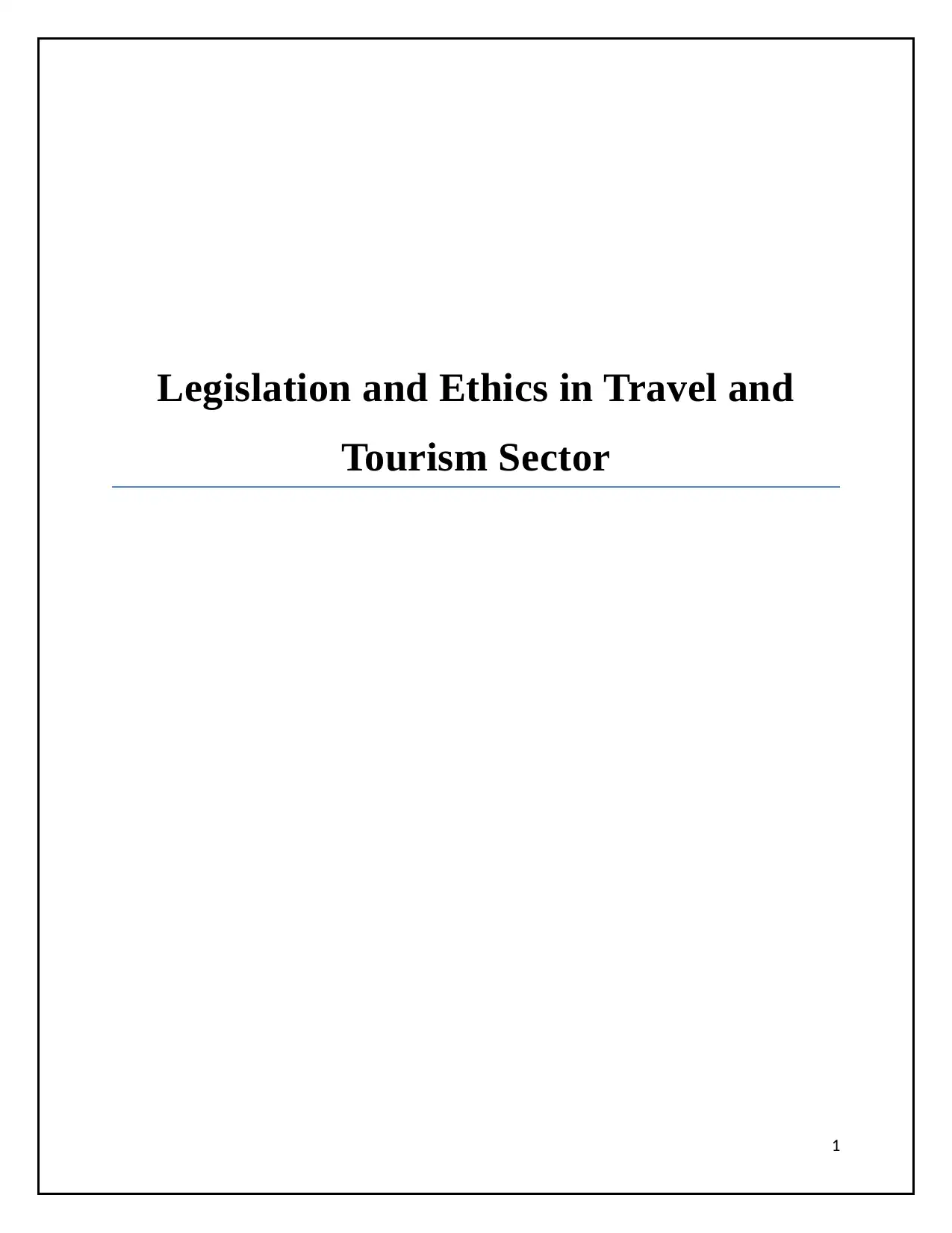
Legislation and Ethics in Travel and
Tourism Sector
1
Tourism Sector
1
Paraphrase This Document
Need a fresh take? Get an instant paraphrase of this document with our AI Paraphraser
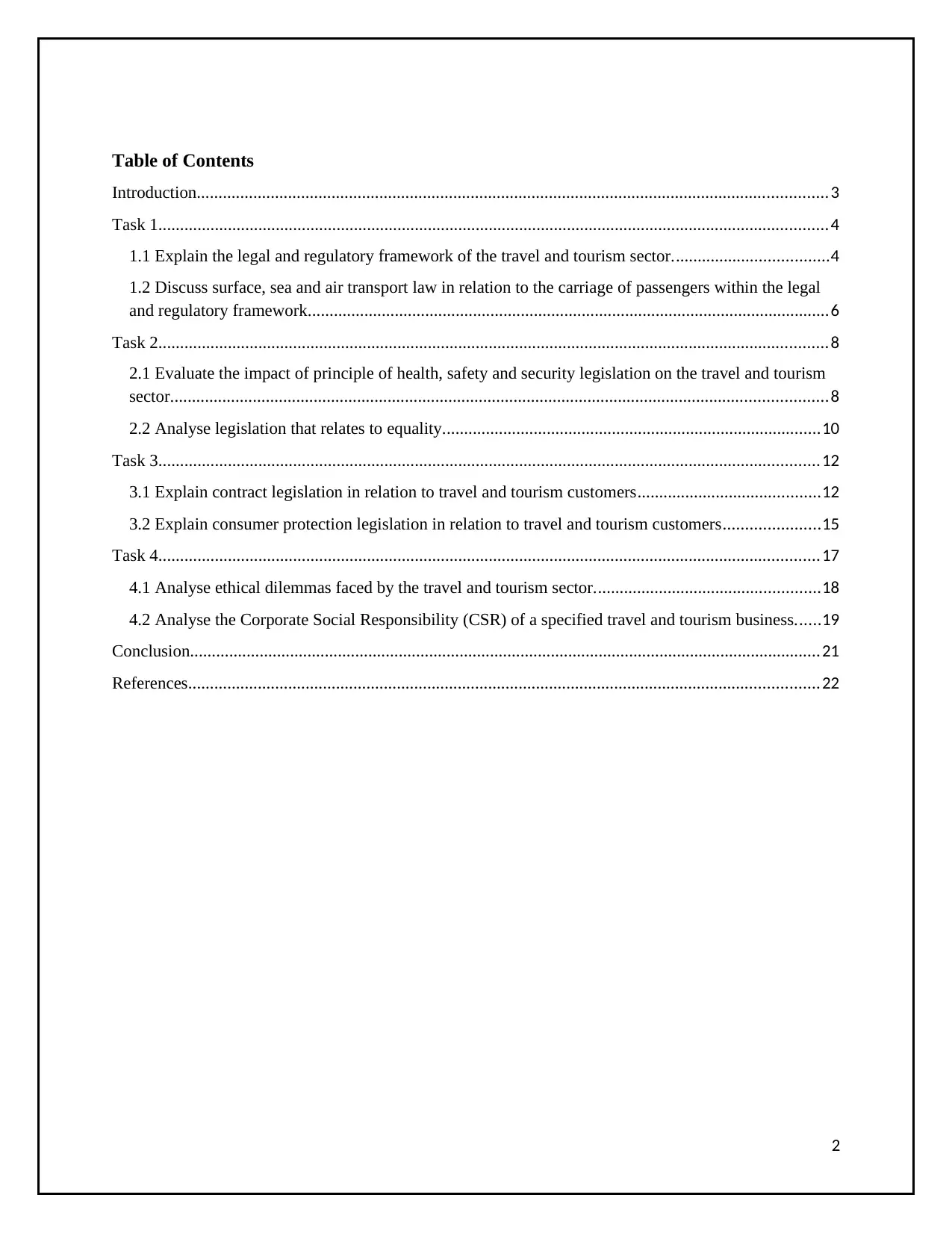
Table of Contents
Introduction.................................................................................................................................................3
Task 1..........................................................................................................................................................4
1.1 Explain the legal and regulatory framework of the travel and tourism sector....................................4
1.2 Discuss surface, sea and air transport law in relation to the carriage of passengers within the legal
and regulatory framework........................................................................................................................6
Task 2..........................................................................................................................................................8
2.1 Evaluate the impact of principle of health, safety and security legislation on the travel and tourism
sector.......................................................................................................................................................8
2.2 Analyse legislation that relates to equality.......................................................................................10
Task 3........................................................................................................................................................12
3.1 Explain contract legislation in relation to travel and tourism customers..........................................12
3.2 Explain consumer protection legislation in relation to travel and tourism customers......................15
Task 4........................................................................................................................................................17
4.1 Analyse ethical dilemmas faced by the travel and tourism sector....................................................18
4.2 Analyse the Corporate Social Responsibility (CSR) of a specified travel and tourism business......19
Conclusion.................................................................................................................................................21
References.................................................................................................................................................22
2
Introduction.................................................................................................................................................3
Task 1..........................................................................................................................................................4
1.1 Explain the legal and regulatory framework of the travel and tourism sector....................................4
1.2 Discuss surface, sea and air transport law in relation to the carriage of passengers within the legal
and regulatory framework........................................................................................................................6
Task 2..........................................................................................................................................................8
2.1 Evaluate the impact of principle of health, safety and security legislation on the travel and tourism
sector.......................................................................................................................................................8
2.2 Analyse legislation that relates to equality.......................................................................................10
Task 3........................................................................................................................................................12
3.1 Explain contract legislation in relation to travel and tourism customers..........................................12
3.2 Explain consumer protection legislation in relation to travel and tourism customers......................15
Task 4........................................................................................................................................................17
4.1 Analyse ethical dilemmas faced by the travel and tourism sector....................................................18
4.2 Analyse the Corporate Social Responsibility (CSR) of a specified travel and tourism business......19
Conclusion.................................................................................................................................................21
References.................................................................................................................................................22
2
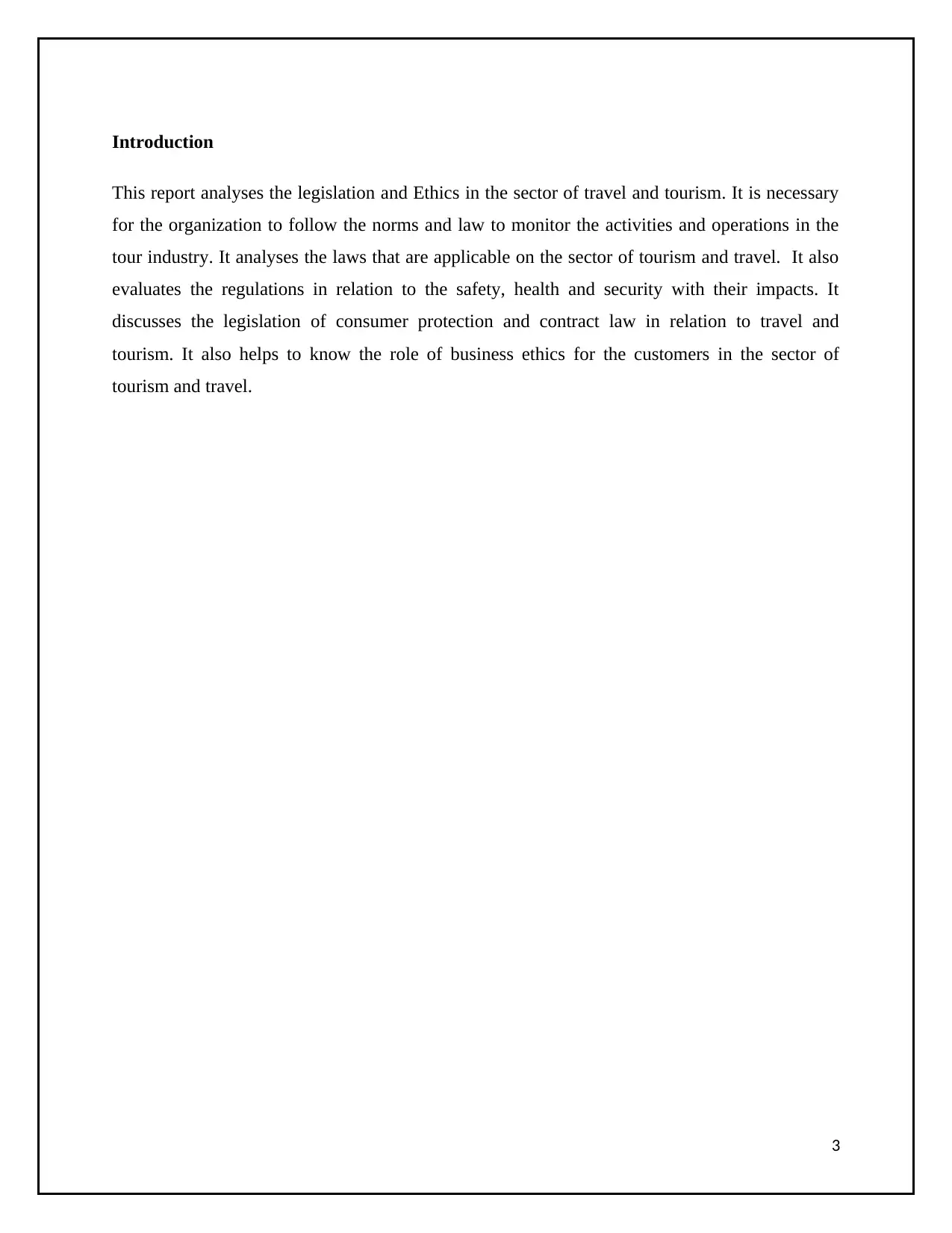
Introduction
This report analyses the legislation and Ethics in the sector of travel and tourism. It is necessary
for the organization to follow the norms and law to monitor the activities and operations in the
tour industry. It analyses the laws that are applicable on the sector of tourism and travel. It also
evaluates the regulations in relation to the safety, health and security with their impacts. It
discusses the legislation of consumer protection and contract law in relation to travel and
tourism. It also helps to know the role of business ethics for the customers in the sector of
tourism and travel.
3
This report analyses the legislation and Ethics in the sector of travel and tourism. It is necessary
for the organization to follow the norms and law to monitor the activities and operations in the
tour industry. It analyses the laws that are applicable on the sector of tourism and travel. It also
evaluates the regulations in relation to the safety, health and security with their impacts. It
discusses the legislation of consumer protection and contract law in relation to travel and
tourism. It also helps to know the role of business ethics for the customers in the sector of
tourism and travel.
3
⊘ This is a preview!⊘
Do you want full access?
Subscribe today to unlock all pages.

Trusted by 1+ million students worldwide
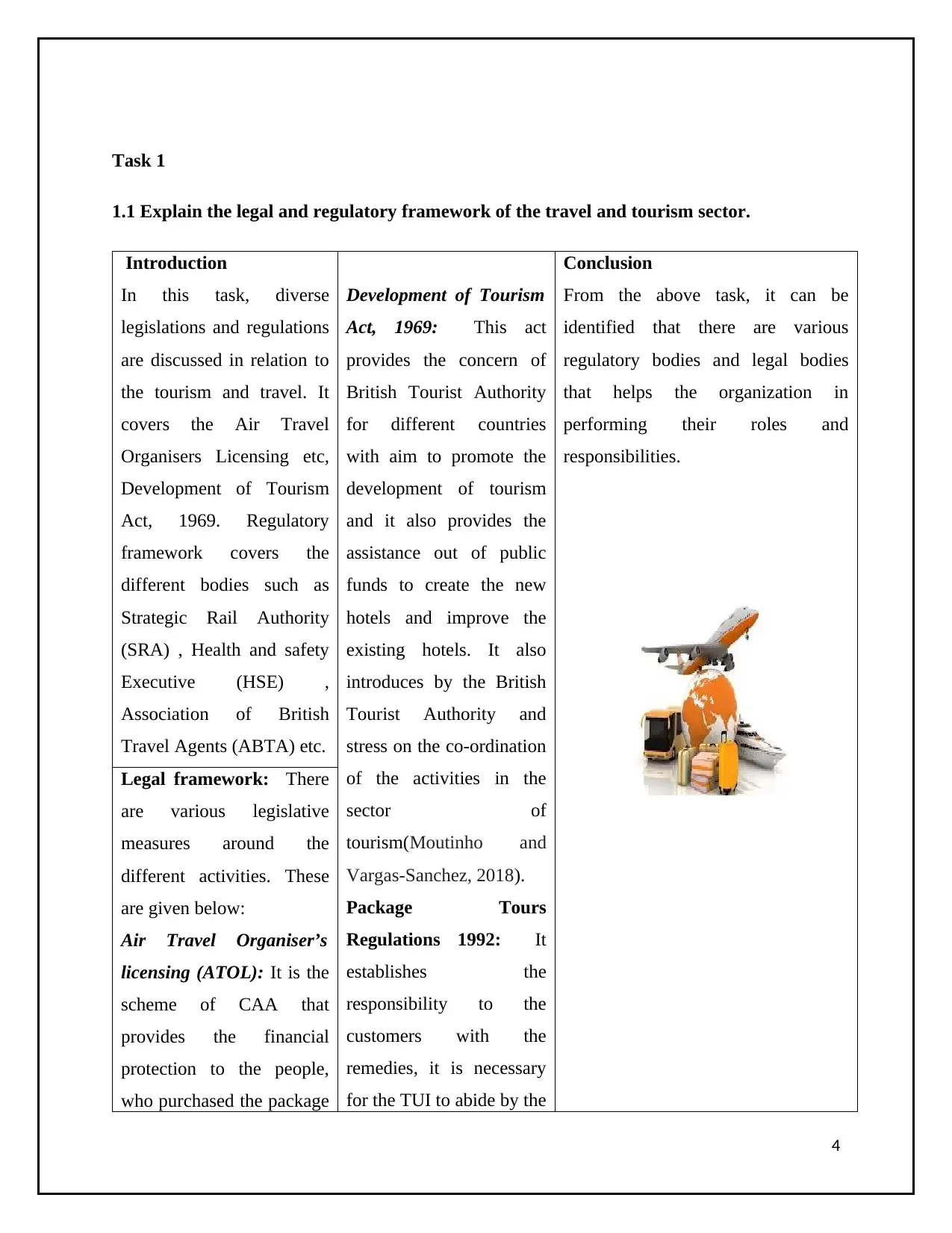
Task 1
1.1 Explain the legal and regulatory framework of the travel and tourism sector.
Introduction
In this task, diverse
legislations and regulations
are discussed in relation to
the tourism and travel. It
covers the Air Travel
Organisers Licensing etc,
Development of Tourism
Act, 1969. Regulatory
framework covers the
different bodies such as
Strategic Rail Authority
(SRA) , Health and safety
Executive (HSE) ,
Association of British
Travel Agents (ABTA) etc.
Development of Tourism
Act, 1969: This act
provides the concern of
British Tourist Authority
for different countries
with aim to promote the
development of tourism
and it also provides the
assistance out of public
funds to create the new
hotels and improve the
existing hotels. It also
introduces by the British
Tourist Authority and
stress on the co-ordination
of the activities in the
sector of
tourism(Moutinho and
Vargas-Sanchez, 2018).
Package Tours
Regulations 1992: It
establishes the
responsibility to the
customers with the
remedies, it is necessary
for the TUI to abide by the
Conclusion
From the above task, it can be
identified that there are various
regulatory bodies and legal bodies
that helps the organization in
performing their roles and
responsibilities.
Legal framework: There
are various legislative
measures around the
different activities. These
are given below:
Air Travel Organiser’s
licensing (ATOL): It is the
scheme of CAA that
provides the financial
protection to the people,
who purchased the package
4
1.1 Explain the legal and regulatory framework of the travel and tourism sector.
Introduction
In this task, diverse
legislations and regulations
are discussed in relation to
the tourism and travel. It
covers the Air Travel
Organisers Licensing etc,
Development of Tourism
Act, 1969. Regulatory
framework covers the
different bodies such as
Strategic Rail Authority
(SRA) , Health and safety
Executive (HSE) ,
Association of British
Travel Agents (ABTA) etc.
Development of Tourism
Act, 1969: This act
provides the concern of
British Tourist Authority
for different countries
with aim to promote the
development of tourism
and it also provides the
assistance out of public
funds to create the new
hotels and improve the
existing hotels. It also
introduces by the British
Tourist Authority and
stress on the co-ordination
of the activities in the
sector of
tourism(Moutinho and
Vargas-Sanchez, 2018).
Package Tours
Regulations 1992: It
establishes the
responsibility to the
customers with the
remedies, it is necessary
for the TUI to abide by the
Conclusion
From the above task, it can be
identified that there are various
regulatory bodies and legal bodies
that helps the organization in
performing their roles and
responsibilities.
Legal framework: There
are various legislative
measures around the
different activities. These
are given below:
Air Travel Organiser’s
licensing (ATOL): It is the
scheme of CAA that
provides the financial
protection to the people,
who purchased the package
4
Paraphrase This Document
Need a fresh take? Get an instant paraphrase of this document with our AI Paraphraser
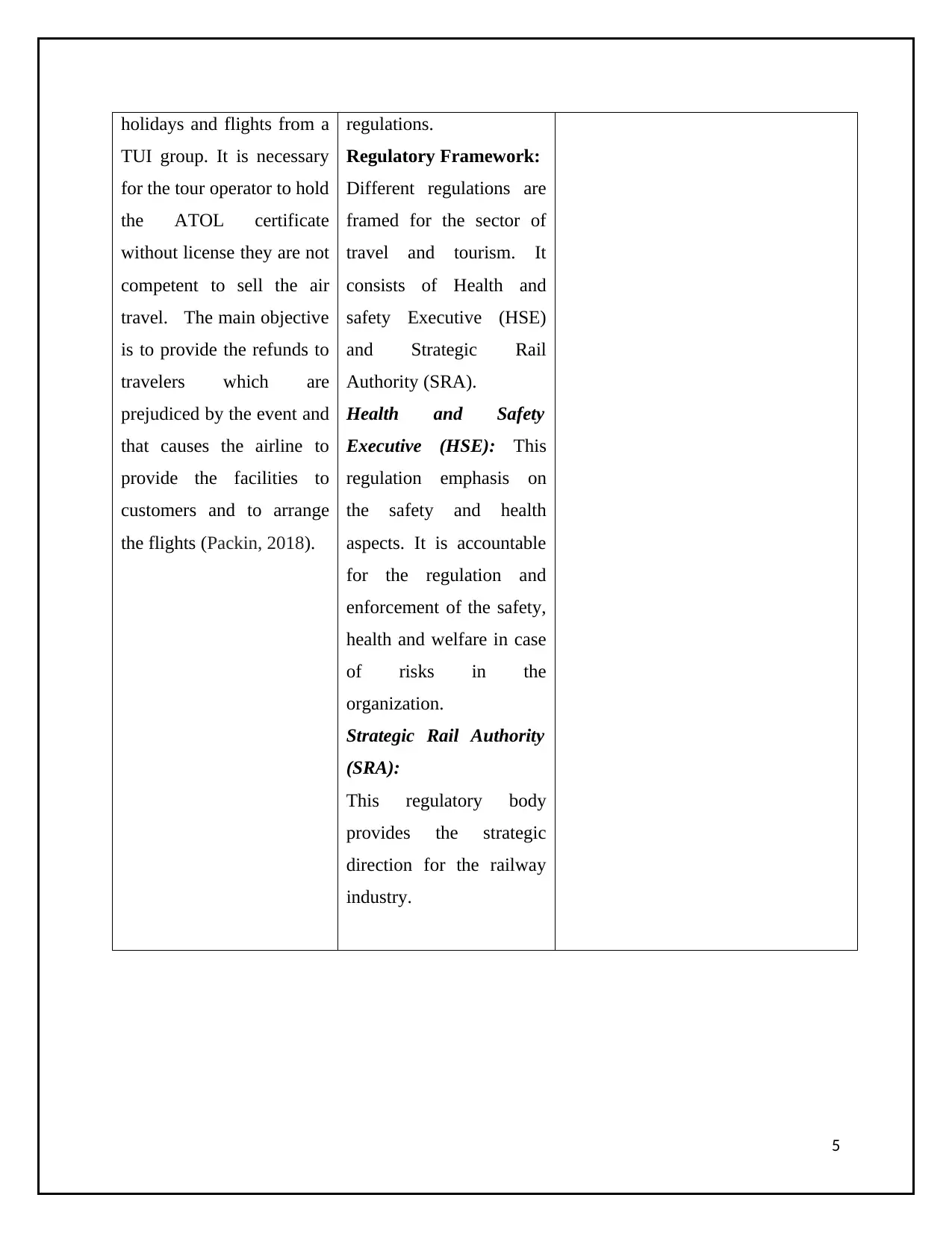
holidays and flights from a
TUI group. It is necessary
for the tour operator to hold
the ATOL certificate
without license they are not
competent to sell the air
travel. The main objective
is to provide the refunds to
travelers which are
prejudiced by the event and
that causes the airline to
provide the facilities to
customers and to arrange
the flights (Packin, 2018).
regulations.
Regulatory Framework:
Different regulations are
framed for the sector of
travel and tourism. It
consists of Health and
safety Executive (HSE)
and Strategic Rail
Authority (SRA).
Health and Safety
Executive (HSE): This
regulation emphasis on
the safety and health
aspects. It is accountable
for the regulation and
enforcement of the safety,
health and welfare in case
of risks in the
organization.
Strategic Rail Authority
(SRA):
This regulatory body
provides the strategic
direction for the railway
industry.
5
TUI group. It is necessary
for the tour operator to hold
the ATOL certificate
without license they are not
competent to sell the air
travel. The main objective
is to provide the refunds to
travelers which are
prejudiced by the event and
that causes the airline to
provide the facilities to
customers and to arrange
the flights (Packin, 2018).
regulations.
Regulatory Framework:
Different regulations are
framed for the sector of
travel and tourism. It
consists of Health and
safety Executive (HSE)
and Strategic Rail
Authority (SRA).
Health and Safety
Executive (HSE): This
regulation emphasis on
the safety and health
aspects. It is accountable
for the regulation and
enforcement of the safety,
health and welfare in case
of risks in the
organization.
Strategic Rail Authority
(SRA):
This regulatory body
provides the strategic
direction for the railway
industry.
5
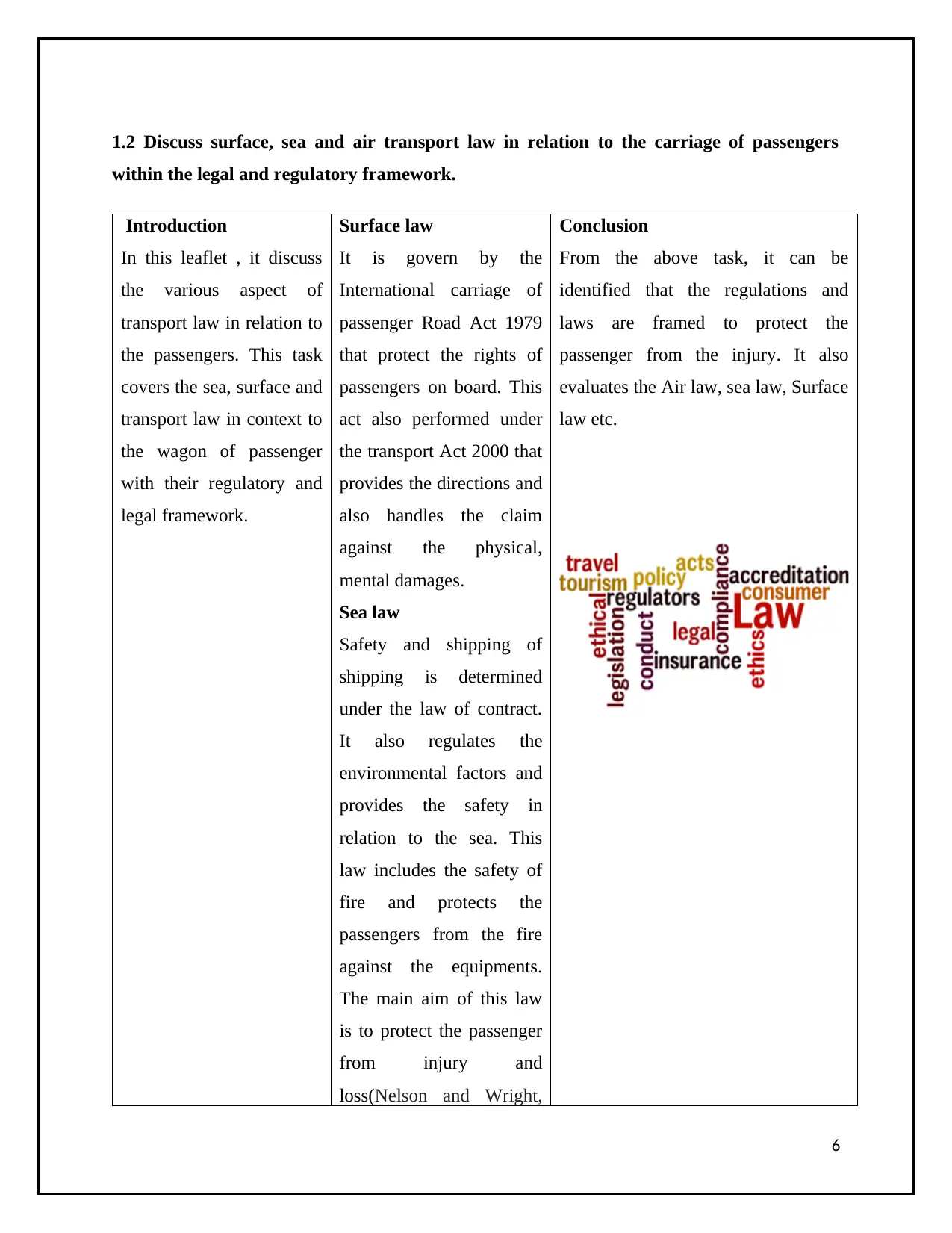
1.2 Discuss surface, sea and air transport law in relation to the carriage of passengers
within the legal and regulatory framework.
Introduction
In this leaflet , it discuss
the various aspect of
transport law in relation to
the passengers. This task
covers the sea, surface and
transport law in context to
the wagon of passenger
with their regulatory and
legal framework.
Surface law
It is govern by the
International carriage of
passenger Road Act 1979
that protect the rights of
passengers on board. This
act also performed under
the transport Act 2000 that
provides the directions and
also handles the claim
against the physical,
mental damages.
Sea law
Safety and shipping of
shipping is determined
under the law of contract.
It also regulates the
environmental factors and
provides the safety in
relation to the sea. This
law includes the safety of
fire and protects the
passengers from the fire
against the equipments.
The main aim of this law
is to protect the passenger
from injury and
loss(Nelson and Wright,
Conclusion
From the above task, it can be
identified that the regulations and
laws are framed to protect the
passenger from the injury. It also
evaluates the Air law, sea law, Surface
law etc.
6
within the legal and regulatory framework.
Introduction
In this leaflet , it discuss
the various aspect of
transport law in relation to
the passengers. This task
covers the sea, surface and
transport law in context to
the wagon of passenger
with their regulatory and
legal framework.
Surface law
It is govern by the
International carriage of
passenger Road Act 1979
that protect the rights of
passengers on board. This
act also performed under
the transport Act 2000 that
provides the directions and
also handles the claim
against the physical,
mental damages.
Sea law
Safety and shipping of
shipping is determined
under the law of contract.
It also regulates the
environmental factors and
provides the safety in
relation to the sea. This
law includes the safety of
fire and protects the
passengers from the fire
against the equipments.
The main aim of this law
is to protect the passenger
from injury and
loss(Nelson and Wright,
Conclusion
From the above task, it can be
identified that the regulations and
laws are framed to protect the
passenger from the injury. It also
evaluates the Air law, sea law, Surface
law etc.
6
⊘ This is a preview!⊘
Do you want full access?
Subscribe today to unlock all pages.

Trusted by 1+ million students worldwide
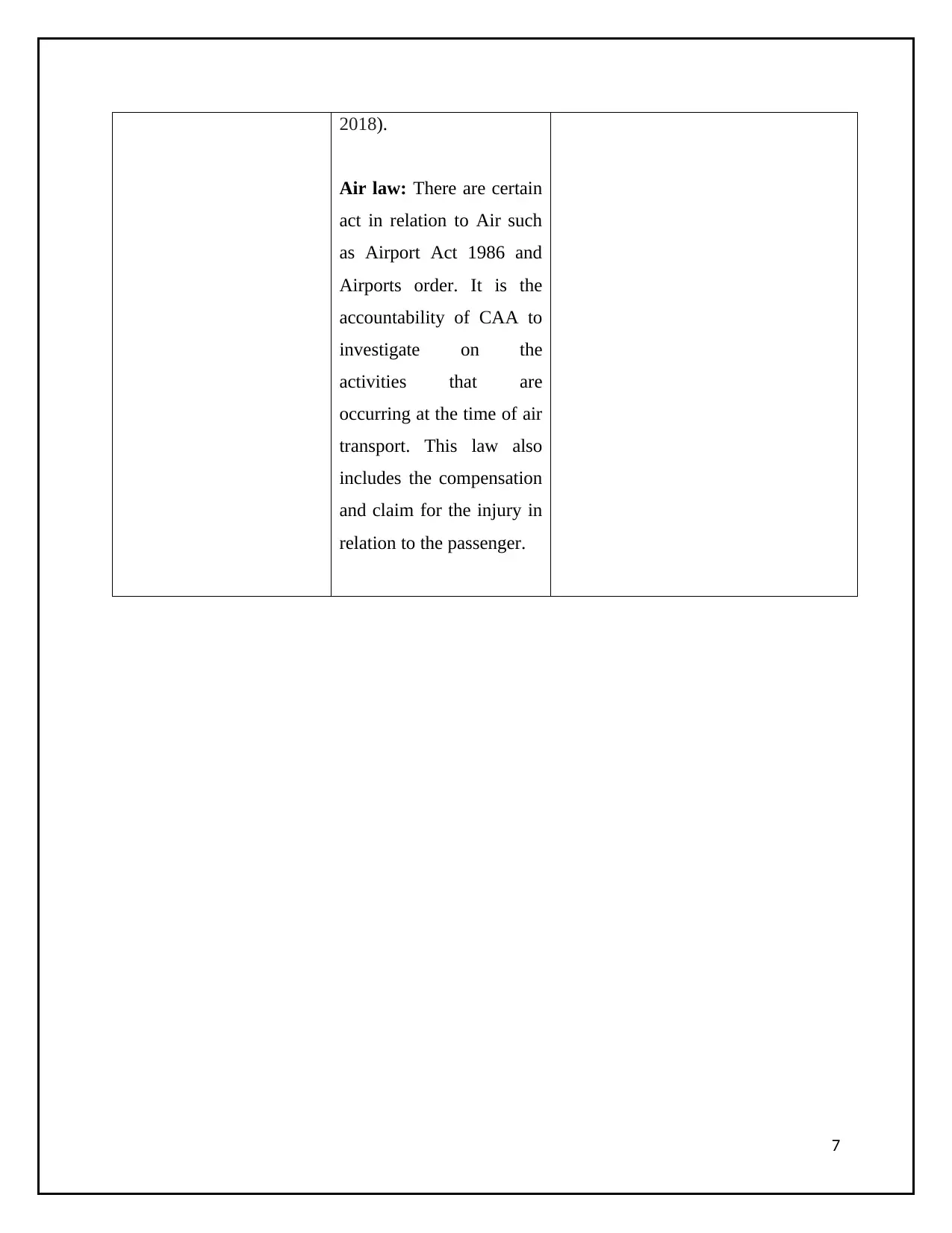
2018).
Air law: There are certain
act in relation to Air such
as Airport Act 1986 and
Airports order. It is the
accountability of CAA to
investigate on the
activities that are
occurring at the time of air
transport. This law also
includes the compensation
and claim for the injury in
relation to the passenger.
7
Air law: There are certain
act in relation to Air such
as Airport Act 1986 and
Airports order. It is the
accountability of CAA to
investigate on the
activities that are
occurring at the time of air
transport. This law also
includes the compensation
and claim for the injury in
relation to the passenger.
7
Paraphrase This Document
Need a fresh take? Get an instant paraphrase of this document with our AI Paraphraser
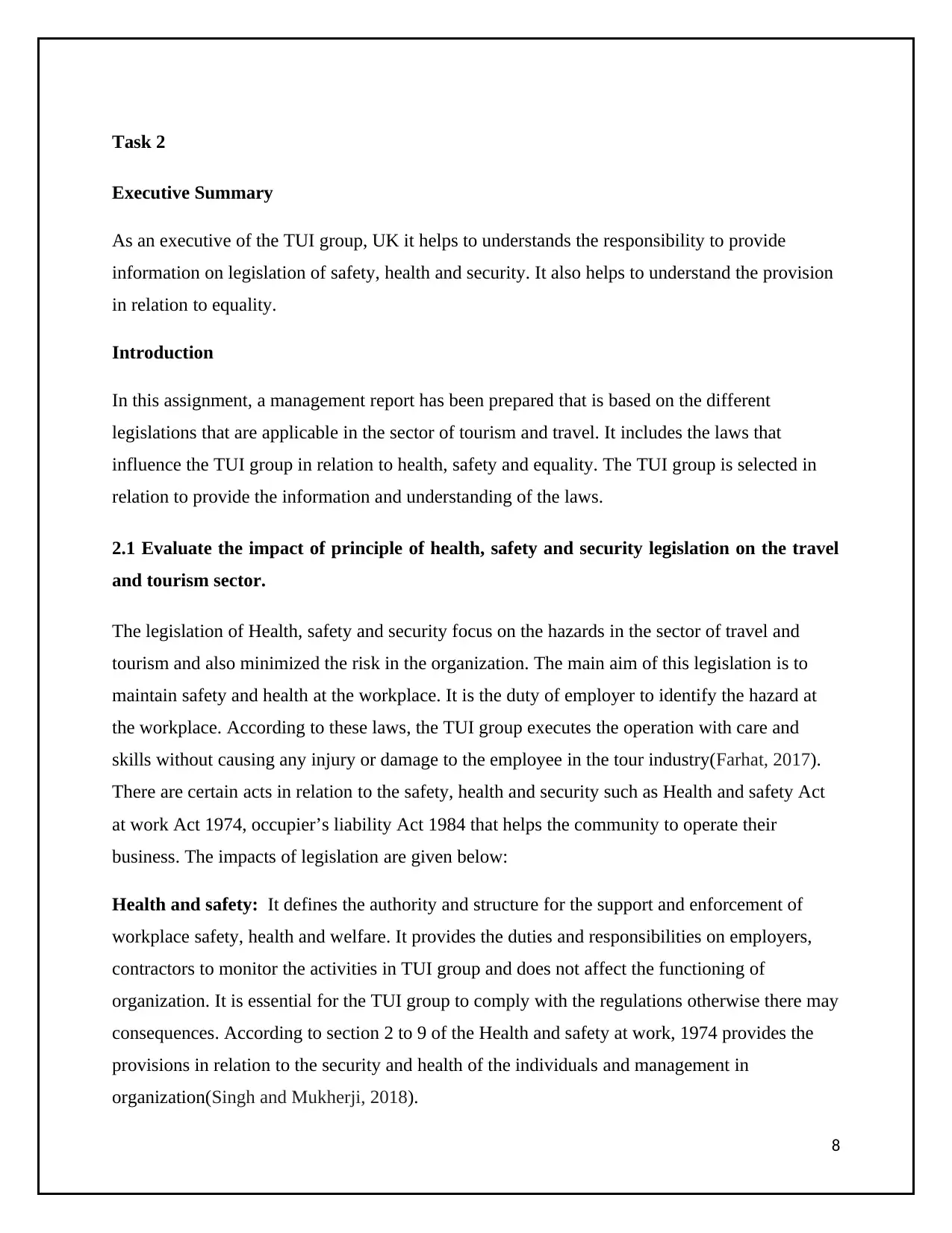
Task 2
Executive Summary
As an executive of the TUI group, UK it helps to understands the responsibility to provide
information on legislation of safety, health and security. It also helps to understand the provision
in relation to equality.
Introduction
In this assignment, a management report has been prepared that is based on the different
legislations that are applicable in the sector of tourism and travel. It includes the laws that
influence the TUI group in relation to health, safety and equality. The TUI group is selected in
relation to provide the information and understanding of the laws.
2.1 Evaluate the impact of principle of health, safety and security legislation on the travel
and tourism sector.
The legislation of Health, safety and security focus on the hazards in the sector of travel and
tourism and also minimized the risk in the organization. The main aim of this legislation is to
maintain safety and health at the workplace. It is the duty of employer to identify the hazard at
the workplace. According to these laws, the TUI group executes the operation with care and
skills without causing any injury or damage to the employee in the tour industry(Farhat, 2017).
There are certain acts in relation to the safety, health and security such as Health and safety Act
at work Act 1974, occupier’s liability Act 1984 that helps the community to operate their
business. The impacts of legislation are given below:
Health and safety: It defines the authority and structure for the support and enforcement of
workplace safety, health and welfare. It provides the duties and responsibilities on employers,
contractors to monitor the activities in TUI group and does not affect the functioning of
organization. It is essential for the TUI group to comply with the regulations otherwise there may
consequences. According to section 2 to 9 of the Health and safety at work, 1974 provides the
provisions in relation to the security and health of the individuals and management in
organization(Singh and Mukherji, 2018).
8
Executive Summary
As an executive of the TUI group, UK it helps to understands the responsibility to provide
information on legislation of safety, health and security. It also helps to understand the provision
in relation to equality.
Introduction
In this assignment, a management report has been prepared that is based on the different
legislations that are applicable in the sector of tourism and travel. It includes the laws that
influence the TUI group in relation to health, safety and equality. The TUI group is selected in
relation to provide the information and understanding of the laws.
2.1 Evaluate the impact of principle of health, safety and security legislation on the travel
and tourism sector.
The legislation of Health, safety and security focus on the hazards in the sector of travel and
tourism and also minimized the risk in the organization. The main aim of this legislation is to
maintain safety and health at the workplace. It is the duty of employer to identify the hazard at
the workplace. According to these laws, the TUI group executes the operation with care and
skills without causing any injury or damage to the employee in the tour industry(Farhat, 2017).
There are certain acts in relation to the safety, health and security such as Health and safety Act
at work Act 1974, occupier’s liability Act 1984 that helps the community to operate their
business. The impacts of legislation are given below:
Health and safety: It defines the authority and structure for the support and enforcement of
workplace safety, health and welfare. It provides the duties and responsibilities on employers,
contractors to monitor the activities in TUI group and does not affect the functioning of
organization. It is essential for the TUI group to comply with the regulations otherwise there may
consequences. According to section 2 to 9 of the Health and safety at work, 1974 provides the
provisions in relation to the security and health of the individuals and management in
organization(Singh and Mukherji, 2018).
8
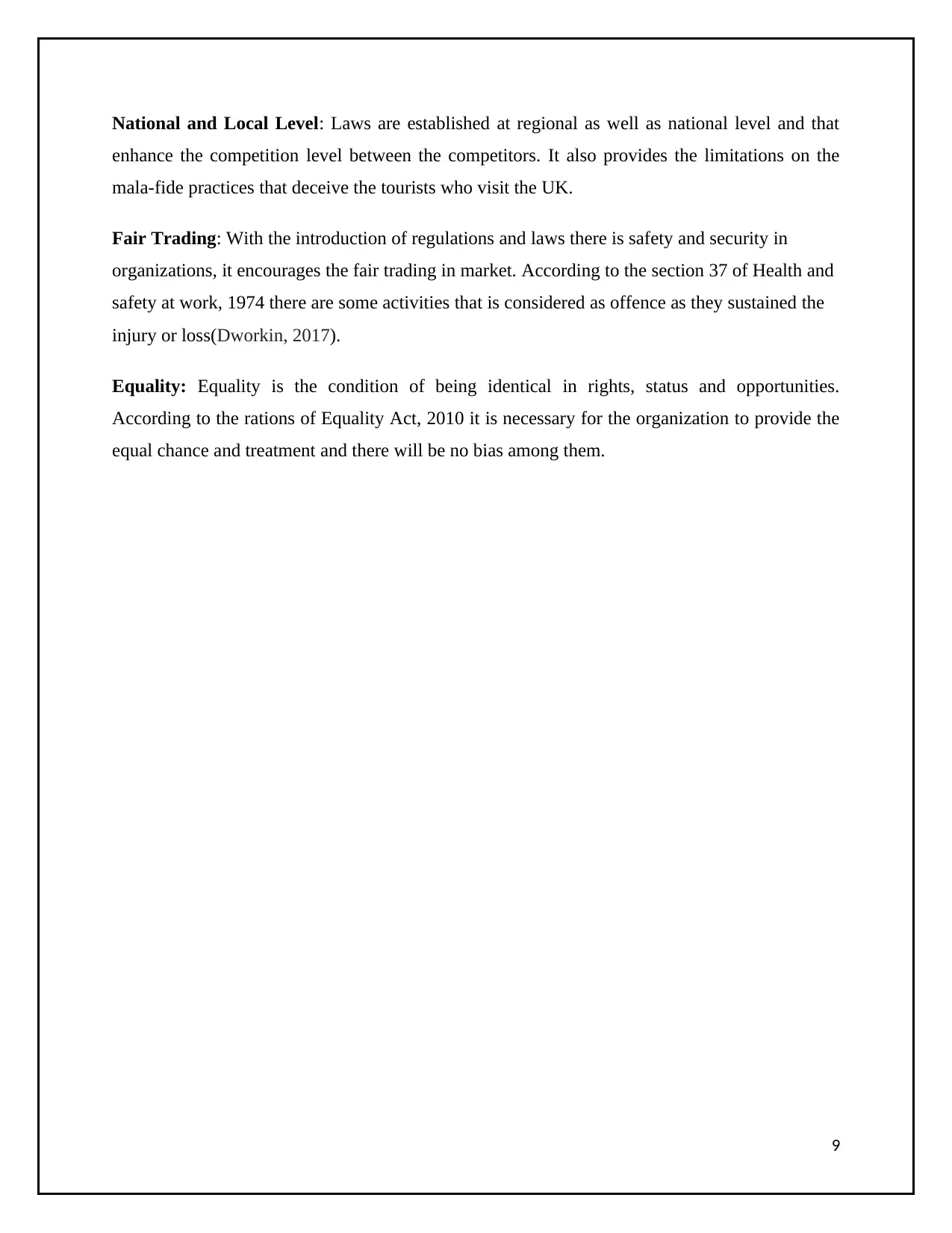
National and Local Level: Laws are established at regional as well as national level and that
enhance the competition level between the competitors. It also provides the limitations on the
mala-fide practices that deceive the tourists who visit the UK.
Fair Trading: With the introduction of regulations and laws there is safety and security in
organizations, it encourages the fair trading in market. According to the section 37 of Health and
safety at work, 1974 there are some activities that is considered as offence as they sustained the
injury or loss(Dworkin, 2017).
Equality: Equality is the condition of being identical in rights, status and opportunities.
According to the rations of Equality Act, 2010 it is necessary for the organization to provide the
equal chance and treatment and there will be no bias among them.
9
enhance the competition level between the competitors. It also provides the limitations on the
mala-fide practices that deceive the tourists who visit the UK.
Fair Trading: With the introduction of regulations and laws there is safety and security in
organizations, it encourages the fair trading in market. According to the section 37 of Health and
safety at work, 1974 there are some activities that is considered as offence as they sustained the
injury or loss(Dworkin, 2017).
Equality: Equality is the condition of being identical in rights, status and opportunities.
According to the rations of Equality Act, 2010 it is necessary for the organization to provide the
equal chance and treatment and there will be no bias among them.
9
⊘ This is a preview!⊘
Do you want full access?
Subscribe today to unlock all pages.

Trusted by 1+ million students worldwide
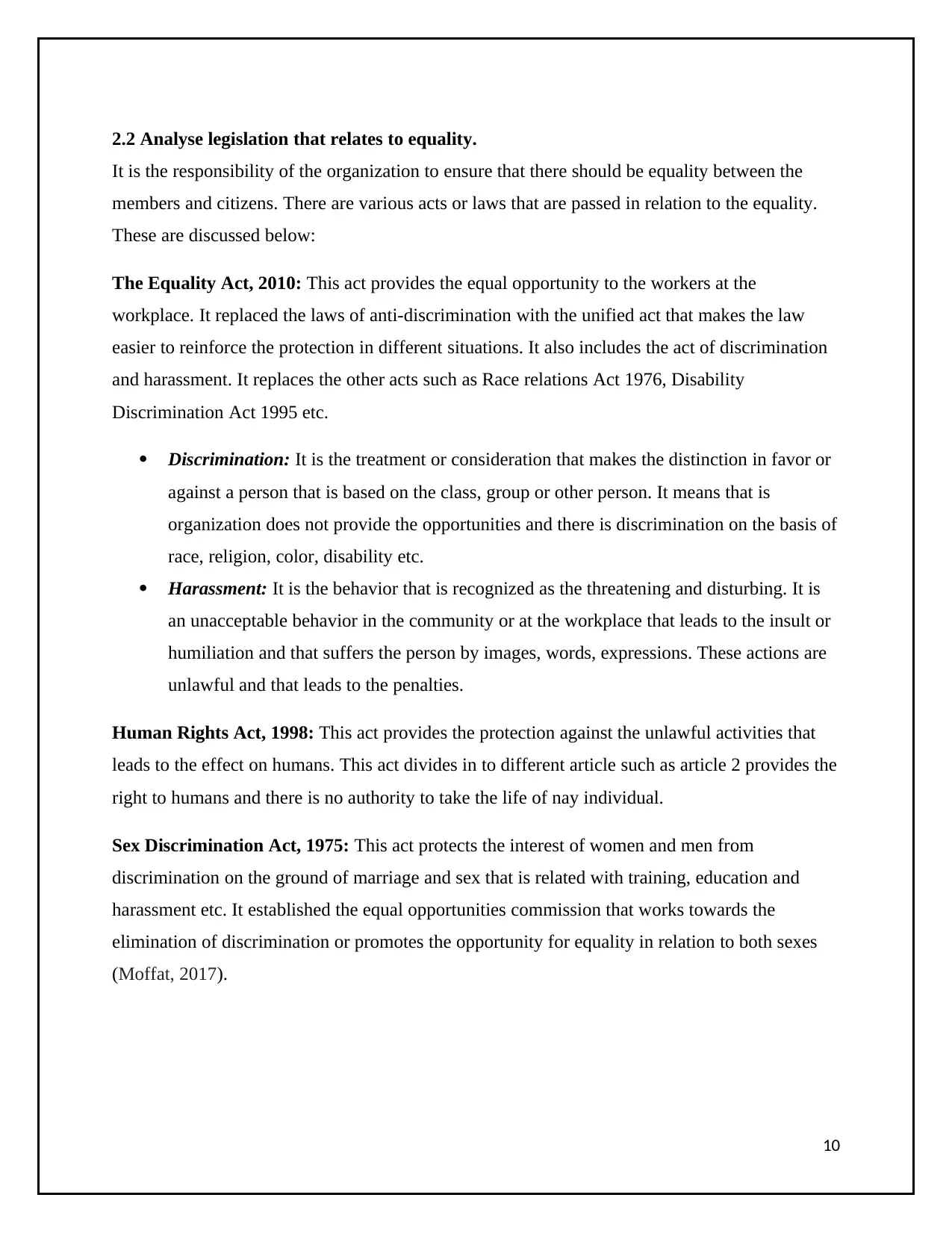
2.2 Analyse legislation that relates to equality.
It is the responsibility of the organization to ensure that there should be equality between the
members and citizens. There are various acts or laws that are passed in relation to the equality.
These are discussed below:
The Equality Act, 2010: This act provides the equal opportunity to the workers at the
workplace. It replaced the laws of anti-discrimination with the unified act that makes the law
easier to reinforce the protection in different situations. It also includes the act of discrimination
and harassment. It replaces the other acts such as Race relations Act 1976, Disability
Discrimination Act 1995 etc.
Discrimination: It is the treatment or consideration that makes the distinction in favor or
against a person that is based on the class, group or other person. It means that is
organization does not provide the opportunities and there is discrimination on the basis of
race, religion, color, disability etc.
Harassment: It is the behavior that is recognized as the threatening and disturbing. It is
an unacceptable behavior in the community or at the workplace that leads to the insult or
humiliation and that suffers the person by images, words, expressions. These actions are
unlawful and that leads to the penalties.
Human Rights Act, 1998: This act provides the protection against the unlawful activities that
leads to the effect on humans. This act divides in to different article such as article 2 provides the
right to humans and there is no authority to take the life of nay individual.
Sex Discrimination Act, 1975: This act protects the interest of women and men from
discrimination on the ground of marriage and sex that is related with training, education and
harassment etc. It established the equal opportunities commission that works towards the
elimination of discrimination or promotes the opportunity for equality in relation to both sexes
(Moffat, 2017).
10
It is the responsibility of the organization to ensure that there should be equality between the
members and citizens. There are various acts or laws that are passed in relation to the equality.
These are discussed below:
The Equality Act, 2010: This act provides the equal opportunity to the workers at the
workplace. It replaced the laws of anti-discrimination with the unified act that makes the law
easier to reinforce the protection in different situations. It also includes the act of discrimination
and harassment. It replaces the other acts such as Race relations Act 1976, Disability
Discrimination Act 1995 etc.
Discrimination: It is the treatment or consideration that makes the distinction in favor or
against a person that is based on the class, group or other person. It means that is
organization does not provide the opportunities and there is discrimination on the basis of
race, religion, color, disability etc.
Harassment: It is the behavior that is recognized as the threatening and disturbing. It is
an unacceptable behavior in the community or at the workplace that leads to the insult or
humiliation and that suffers the person by images, words, expressions. These actions are
unlawful and that leads to the penalties.
Human Rights Act, 1998: This act provides the protection against the unlawful activities that
leads to the effect on humans. This act divides in to different article such as article 2 provides the
right to humans and there is no authority to take the life of nay individual.
Sex Discrimination Act, 1975: This act protects the interest of women and men from
discrimination on the ground of marriage and sex that is related with training, education and
harassment etc. It established the equal opportunities commission that works towards the
elimination of discrimination or promotes the opportunity for equality in relation to both sexes
(Moffat, 2017).
10
Paraphrase This Document
Need a fresh take? Get an instant paraphrase of this document with our AI Paraphraser
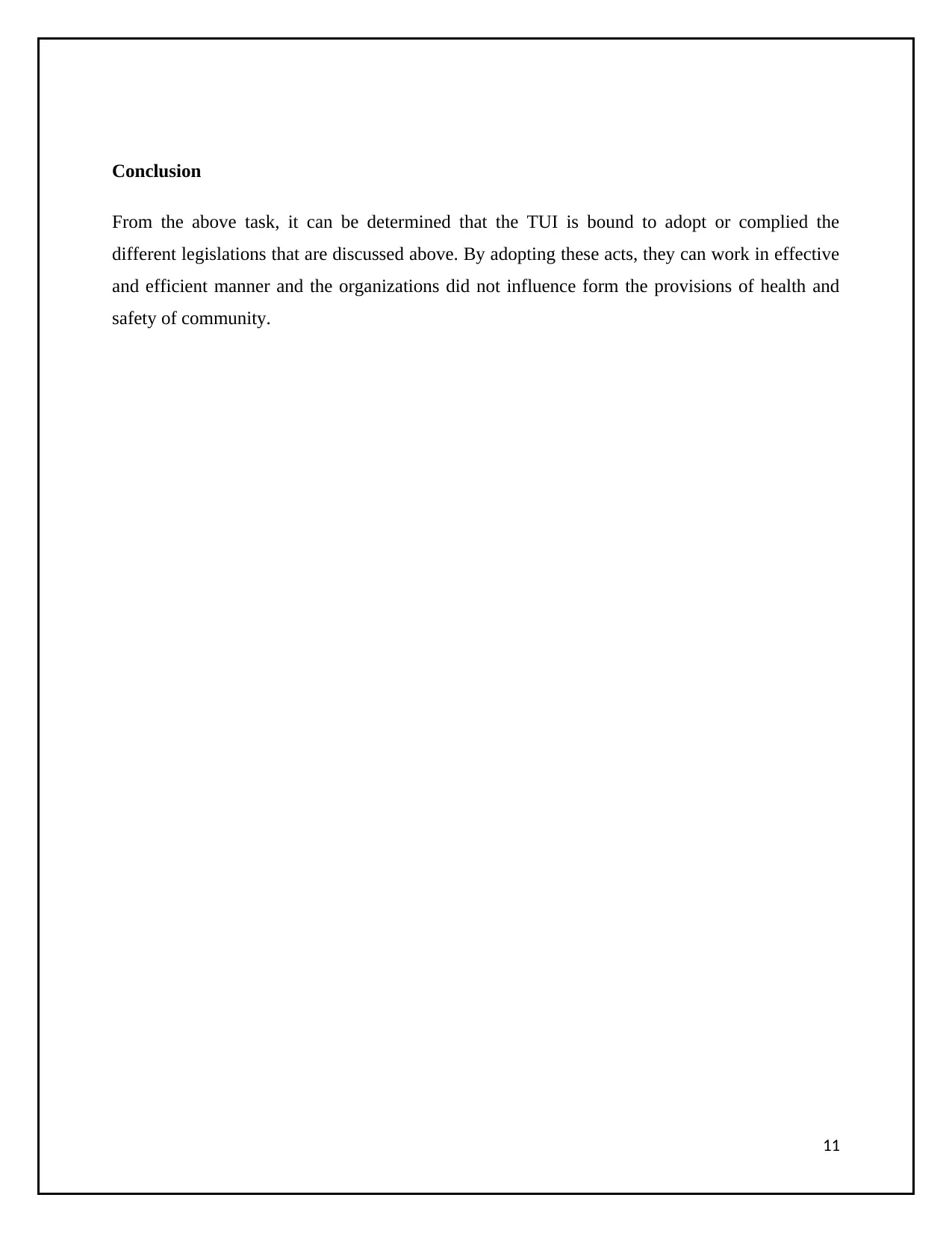
Conclusion
From the above task, it can be determined that the TUI is bound to adopt or complied the
different legislations that are discussed above. By adopting these acts, they can work in effective
and efficient manner and the organizations did not influence form the provisions of health and
safety of community.
11
From the above task, it can be determined that the TUI is bound to adopt or complied the
different legislations that are discussed above. By adopting these acts, they can work in effective
and efficient manner and the organizations did not influence form the provisions of health and
safety of community.
11
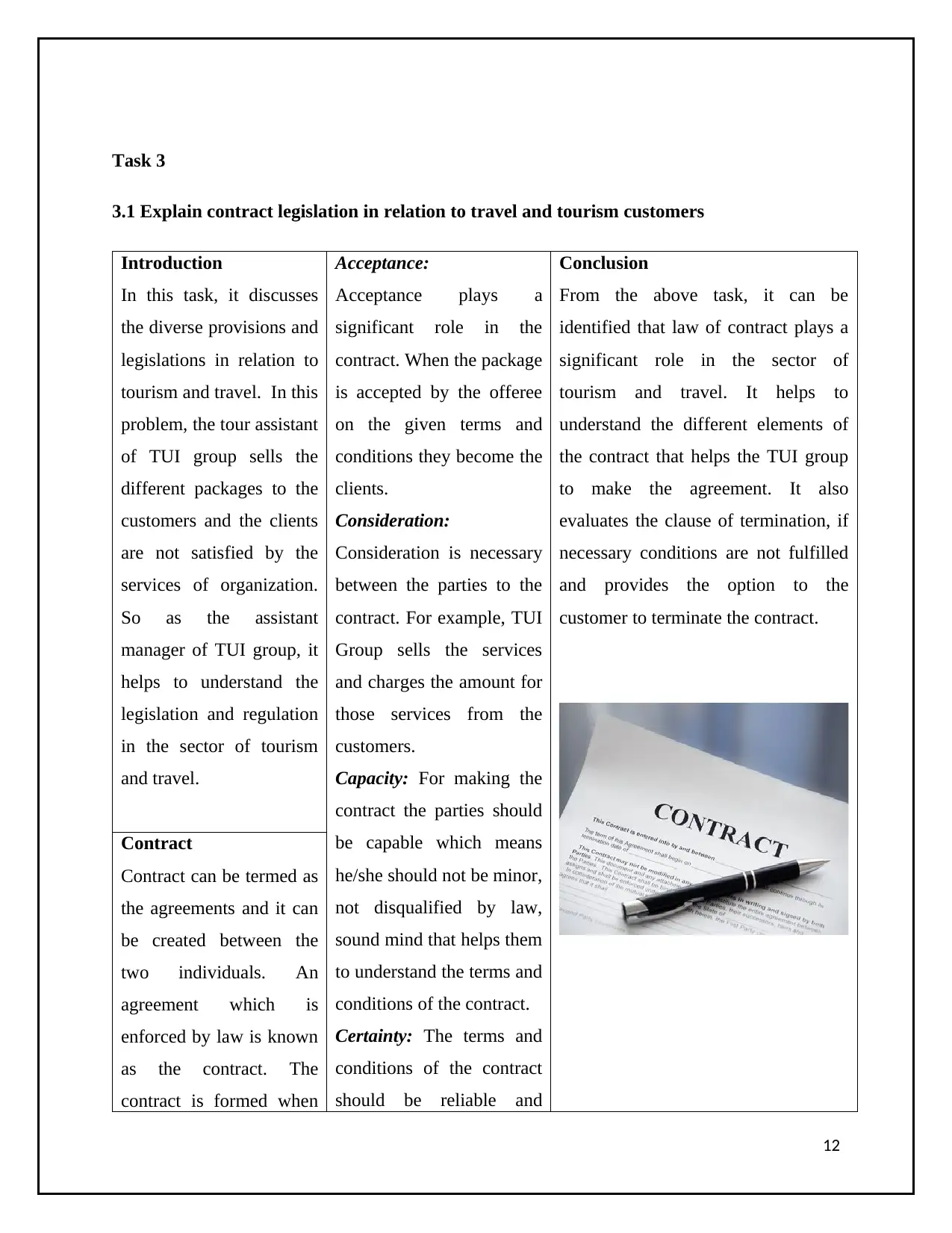
Task 3
3.1 Explain contract legislation in relation to travel and tourism customers
Introduction
In this task, it discusses
the diverse provisions and
legislations in relation to
tourism and travel. In this
problem, the tour assistant
of TUI group sells the
different packages to the
customers and the clients
are not satisfied by the
services of organization.
So as the assistant
manager of TUI group, it
helps to understand the
legislation and regulation
in the sector of tourism
and travel.
Acceptance:
Acceptance plays a
significant role in the
contract. When the package
is accepted by the offeree
on the given terms and
conditions they become the
clients.
Consideration:
Consideration is necessary
between the parties to the
contract. For example, TUI
Group sells the services
and charges the amount for
those services from the
customers.
Capacity: For making the
contract the parties should
be capable which means
he/she should not be minor,
not disqualified by law,
sound mind that helps them
to understand the terms and
conditions of the contract.
Certainty: The terms and
conditions of the contract
should be reliable and
Conclusion
From the above task, it can be
identified that law of contract plays a
significant role in the sector of
tourism and travel. It helps to
understand the different elements of
the contract that helps the TUI group
to make the agreement. It also
evaluates the clause of termination, if
necessary conditions are not fulfilled
and provides the option to the
customer to terminate the contract.
Contract
Contract can be termed as
the agreements and it can
be created between the
two individuals. An
agreement which is
enforced by law is known
as the contract. The
contract is formed when
12
3.1 Explain contract legislation in relation to travel and tourism customers
Introduction
In this task, it discusses
the diverse provisions and
legislations in relation to
tourism and travel. In this
problem, the tour assistant
of TUI group sells the
different packages to the
customers and the clients
are not satisfied by the
services of organization.
So as the assistant
manager of TUI group, it
helps to understand the
legislation and regulation
in the sector of tourism
and travel.
Acceptance:
Acceptance plays a
significant role in the
contract. When the package
is accepted by the offeree
on the given terms and
conditions they become the
clients.
Consideration:
Consideration is necessary
between the parties to the
contract. For example, TUI
Group sells the services
and charges the amount for
those services from the
customers.
Capacity: For making the
contract the parties should
be capable which means
he/she should not be minor,
not disqualified by law,
sound mind that helps them
to understand the terms and
conditions of the contract.
Certainty: The terms and
conditions of the contract
should be reliable and
Conclusion
From the above task, it can be
identified that law of contract plays a
significant role in the sector of
tourism and travel. It helps to
understand the different elements of
the contract that helps the TUI group
to make the agreement. It also
evaluates the clause of termination, if
necessary conditions are not fulfilled
and provides the option to the
customer to terminate the contract.
Contract
Contract can be termed as
the agreements and it can
be created between the
two individuals. An
agreement which is
enforced by law is known
as the contract. The
contract is formed when
12
⊘ This is a preview!⊘
Do you want full access?
Subscribe today to unlock all pages.

Trusted by 1+ million students worldwide
1 out of 23
Related Documents
Your All-in-One AI-Powered Toolkit for Academic Success.
+13062052269
info@desklib.com
Available 24*7 on WhatsApp / Email
![[object Object]](/_next/static/media/star-bottom.7253800d.svg)
Unlock your academic potential
Copyright © 2020–2026 A2Z Services. All Rights Reserved. Developed and managed by ZUCOL.




